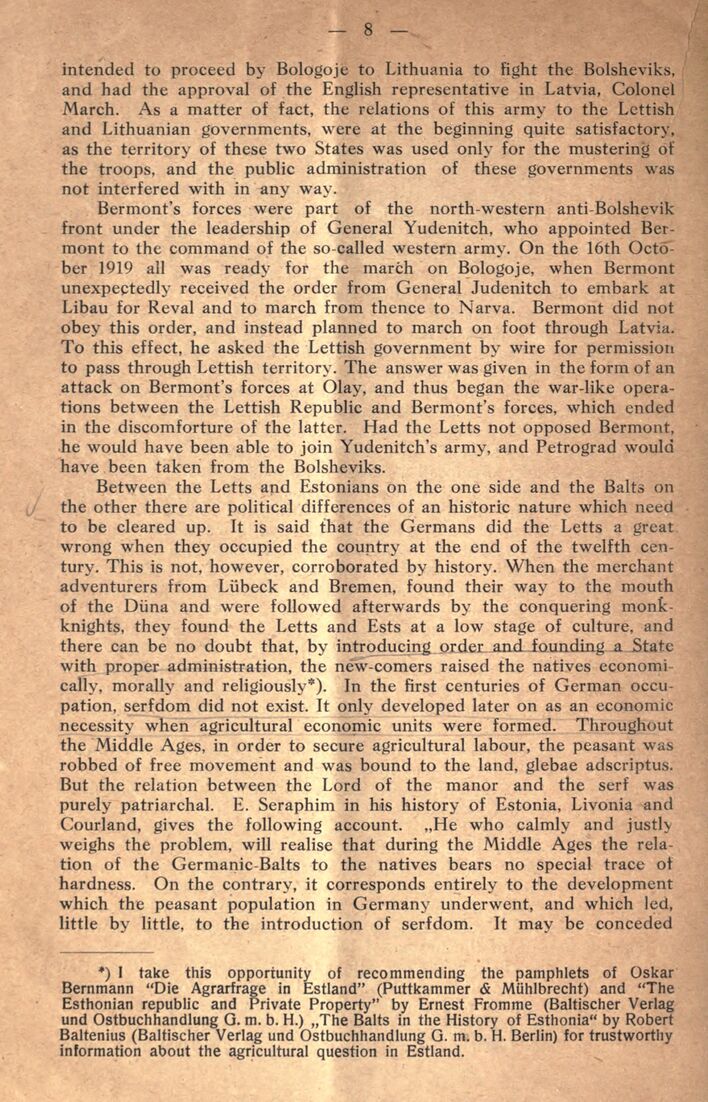
Full resolution (JPEG) - On this page / på denna sida - Chapter I. An Historic Survey of the Cultural Conditions of the Baltic Lands

<< prev. page << föreg. sida << >> nästa sida >> next page >>
Below is the raw OCR text
from the above scanned image.
Do you see an error? Proofread the page now!
Här nedan syns maskintolkade texten från faksimilbilden ovan.
Ser du något fel? Korrekturläs sidan nu!
This page has been proofread at least once.
(diff)
(history)
Denna sida har korrekturlästs minst en gång.
(skillnad)
(historik)
intended to proceed by Bologoje to Lithuania to fight the Bolsheviks,
and had the approval of the English representative in Latvia, Colonel
March. As a matter of fact, the relations of this army to the Lettish
and Lithuanian governments, were at the beginning quite satisfactory,
as the territory of these two States was used only for the mustering of
the troops, and the public administration of these governments was
not interfered with in any way.
Bermont’s forces were part of the north-western anti-Bolshevik
front under the leadership of General Yudenitch, who appointed
Bermont to the command of the so-called western armv. On the 16th
October 1919 all was ready for the march on Bologoje, when Bermont
unexpectedly received the order from General Judenitch to embark at
Libau for Reval and to march from thence to Narva. Bermont did not
obey this order, and instead planned to march on foot through Latvia.
To this effect, he asked the Lettish government by wire for permission
to pass through Lettish territory. The answer was given in the form of an
attack on Bermont’s forces at Olay, and thus began the war-like
operations between the Lettish Republic and Bermont’s forces, which ended
in the discomforture of the latter. Had the Letts not opposed Bermont,
he would have been able to join Yudenitch’s army, and Petrograd would
have been taken from the Bolsheviks.
Between the Letts and Estonians on the one side and the Balts on
the other there are political differences of an historic nature which need
to be cleared up. It is said that the Germans did the Letts a great
wrong when they occupied the country at the end of the twelfth
century. This is not, however, corroborated by history. When the merchant
adventurers from Lübeck and Bremen, found their way to the mouth
of the Düna and were followed afterwards by the conquering
monk-knights, they found the Letts and Ests at a low stage of culture, and
there can be no doubt that, by introducing order and founding a State
with proper administration, the new-comers raised the natives
economically, morally and religiously[1]. In the first centuries of German
occupation, serfdom did not exist. It only developed later on as an economic
necessity when agricultural economic units were formed. Throughout
the Middle Ages, in order to secure agricultural labour, the peasant was
robbed of free movement and was bound to the land, glebae adscriptus.
But the relation between the Lord of the manor and the serf was
purely patriarchal. E. Seraphim in his history of Estonia, Livonia and
Courland, gives the following account. „He who calmly and justly
weighs the problem, will realise that during the Middle Ages the
relation of the Germanic-Balts to the natives bears no special trace of
hardness. On the contrary, it corresponds entirely to the development
which the peasant population in Germany underwent, and which led,
little by little, to the introduction of serfdom. It may be conceded
<< prev. page << föreg. sida << >> nästa sida >> next page >>